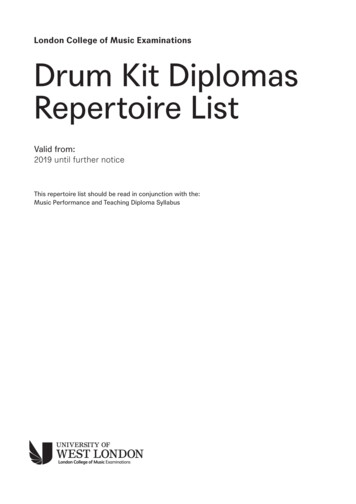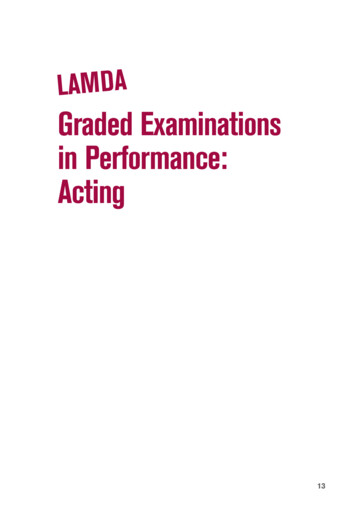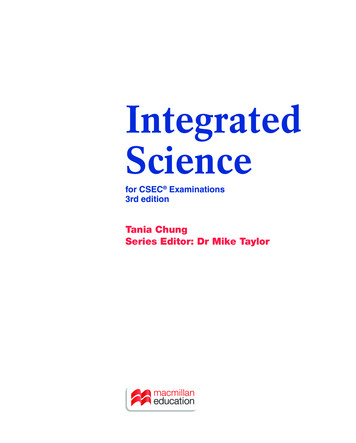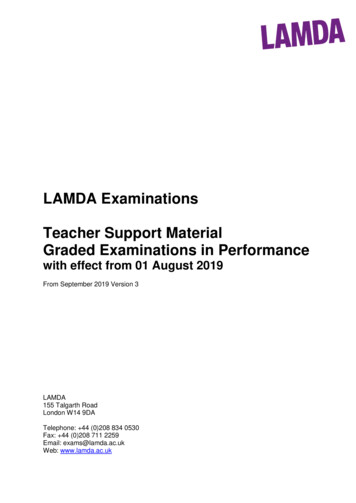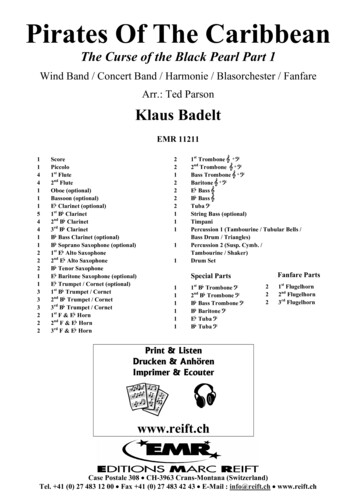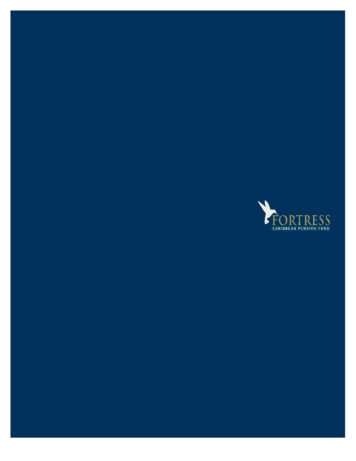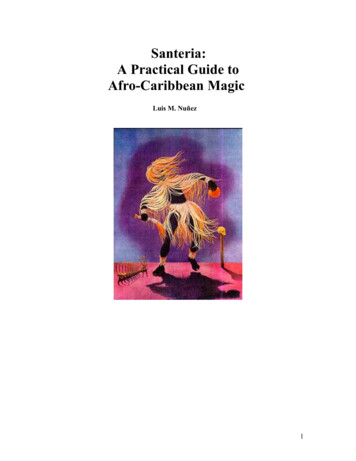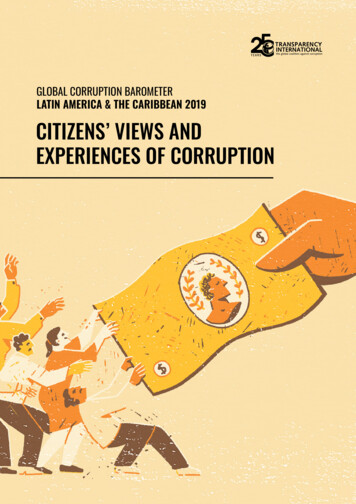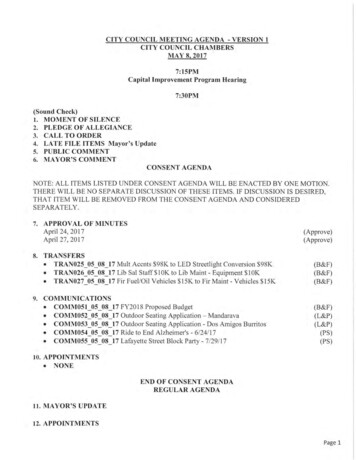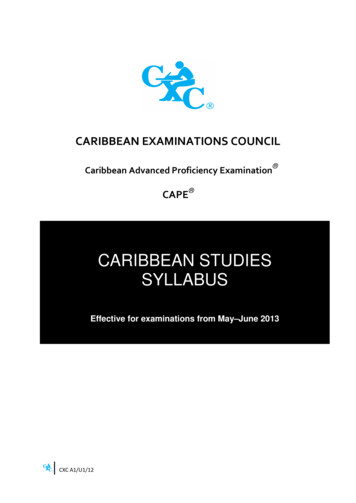
Transcription
CARIBBEAN EXAMINATIONS COUNCILCaribbean Advanced Proficiency Examination CAPE CARIBBEAN STUDIESSYLLABUSEffective for examinations from May–June 2013CXC A1/U1/12
Published by the Caribbean Examinations Council 2013, Caribbean Examinations CouncilAll rights reserved. No part of this publication may be reproduced, stored in a retrieval system, ortransmitted in any form, or by any means electronic, photocopying, recording or otherwise withoutprior permission of the author or publisher.Correspondence related to the syllabus should be addressed to:The Pro-RegistrarCaribbean Examinations CouncilCaenwood Centre37 Arnold Road, Kingston 5, JamaicaTelephone Number: 1 (876) 630-5200Facsimile Number: 1 (876) 967-4972E-mail Address: cxcwzo@cxc.orgWebsite: www.cxc.orgCopyright 2013 by Caribbean Examinations CouncilThe Garrison, St Michael BB14038, BarbadosCXC A1/U1/12
This document CXC A1/U1/12 replaces CXC A1/U1/03 issued in 2003.Please note that the syllabus has been revised and amendments are indicated by italics.First issued 1998Revised 2003Revised 2012Please check the website, www.cxc.org for updates on CXC’s syllabuses.CXC A1/U1/12
ContentsINTRODUCTION . .iRATIONALE . 1AIMS . 1SKILLS AND ABILITIES TO BE ASSESSED . 2PRE-REQUISITES OF THE SYLLABUS. 3STRUCTURE OF THE SYLLABUS . 4APPROACHES TO TEACHING THE SYLLABUS . 4MODULE 1: CARIBBEAN SOCIETY AND CULTURE . 5MODULE 2: ISSUES IN CARIBBEAN DEVELOPMENT . 13MODULE 3: INVESTIGATING ISSUES IN THE CARIBBEAN. 20OUTLINE OF ASSESSMENT . 31REGULATIONS FOR PRIVATE CANDIDATES . 41REGULATIONS FOR RESIT CANDIDATES . 44ASSESSMENT GRID . 45GLOSSARY OF BEHAVIOURAL VERBS USED IN THE CARIBBEAN STUDIESEXAMINATION. 46RECOMMENDED READINGS . 48CXC A1/U1/12
IntroductionThe Caribbean Advanced Proficiency Examination (CAPE) is designed to provide certification of theacademic, vocational and technical achievement of students in the Caribbean who, havingcompleted a minimum of five years of secondary education, wish to further their studies. Theexaminations address the skills and knowledge acquired by students under a flexible and articulatedsystem where subjects are organised in 1-Unit or 2-Unit courses with each Unit containing threeModules. Subjects examined under CAPE may be studied concurrently or singly.The Caribbean Examinations Council offers three types of certification. The first is the award of acertificate showing each CAPE Unit completed. The second is the CAPE Diploma, awarded tocandidates who have satisfactorily completed at least six Units including Caribbean Studies. The thirdis the CXC Associate Degree, awarded for the satisfactory completion of a prescribed cluster of sevenCAPE Units including Caribbean Studies and Communication Studies. For the CAPE Diploma and theCXC Associate Degree, candidates must complete the cluster of required Units within a maximumperiod of five years.Recognised educational institutions presenting candidates for the CXC Associate Degree in one of thenine categories must, on registering these candidates at the start of the qualifying year, have themconfirm, in the required form, the Associate Degree they wish to be awarded. Candidates will not beawarded any possible alternatives for which they did not apply.CXC A1/U1/12i
Caribbean Studies Syllabus RATIONALECaribbean Studies is an interdisciplinary field of study that draws on perspectives, largely from thehumanities and social sciences to provide an understanding of Caribbean society and cultures.For the purpose of this syllabus, the Caribbean region is defined in terms of its geography, commonhistorical experiences, cultural identities, participation in the global community, intermixing ofdiverse ethnic and racial groups, and its continuing struggle for survival and sovereignty. The regioncomprises mainland territories including Belize, Suriname, Guyana; and island states; such as theLesser and Greater Antilles; the Bahamas, Bermuda, Trinidad and Tobago and the NetherlandAntilles. It also includes Caribbean diasporic communities.This interdisciplinary subject provides students with the opportunity to study issues relevant to thedistinctive physical, political and socio-economic challenges facing the small states which comprisethe region. Such study integrates perspectives from various disciplines including, Cultural Studiesand Ethics, Economics, Government and Politics, History, International relations, Physical and HumanEcology, and Sociology, as tools for understanding Caribbean society and culture.Students who successfully complete a course in Caribbean Studies will have developed anappreciation for the challenges and potential of being Caribbean citizens. They will have anunderstanding of their own roles and responsibilities in preserving and contributing to theirCaribbean heritage. They will have attained attributes of the Ideal Caribbean Person who "is awareof the importance of living in harmony with the environment" and "has a strong appreciation offamily and kinship values, community cohesion, and moral issues including responsibility for andaccountability to self and community." Students will also have acquired skills of enquiry as definedin the UNESCO Pillars of Learning that will enable them to succeed in their academic careers and theworld of work, and that will foster the exploration and development of their Caribbean identities.Finally, they will recognise these identities as continually evolving out of the interactions taking placeamong the cultures of the Caribbean region and the diaspora, and between the Caribbean and therest of the world. AIMSThis syllabus aims to:1.develop an understanding of the factors which influence the evolution of Caribbean societyand culture in the region and its diaspora;2.develop an awareness of how current global trends and cultures affect, and are affected by,the Caribbean Region and its diaspora;CXC A1/U1/121
3.develop an understanding of the issues which are important to the development of theCaribbean Region and its diaspora;4.develop the capability to investigate and report on issues which promote a betterunderstanding of the Caribbean region and its diaspora;5.encourage reflection on how factors which have shaped the Caribbean Region and itsdiaspora, have influenced their lives and the lives of their communities;6.develop a respect for Caribbean cultural diversity and identities;7.develop an appreciation of the importance of dealing justly and equitably with other groupsand individuals;8.develop the ability to apply acquired skills and abilities in making decisions and respondingto challenges in their personal lives. SKILLS AND ABILITIES TO BE ASSESSEDThe skills and abilities that students are expected to develop on completion of this syllabus havebeen grouped under three headings:(a)(b)(c)Knowledge and Comprehension;Use of Knowledge;Enquiry and Communication.Knowledge and ComprehensionThe ability to:(a)understand the facts, concepts, principles, processes and theories covered by the syllabus;(b)understand the range of experiences that have shaped Caribbean society and culture;(c)explain different perspectives of development in the Caribbean Region and diaspora;(d)understand the nature and purpose of research.CXC A1/U1/122
Use of KnowledgeThe ability to:(a)use facts, concepts and principles;(b)organise information as a basis for classification;(c)apply facts and knowledge to illustrate a range of phenomena;(d)assess the relevance of various perspectives for understanding issues in the Caribbean Regionand its diaspora;(e)interpret and make inferences from data;(f)appreciate the limitations of data;(g)make lusionsandmakerelevantEnquiry and CommunicationThe ability to:(a)use primary and secondary sources of data collection;(b)analyse and evaluate various sources of information;(c)use various methods of investigation;(d)investigate issues related to Caribbean society and culture;(e)draw reasoned conclusions based on data findings;(f)communicate ideas, findings and recommendations, clearly and logically in appropriateformat. PRE-REQUISITES OF THE SYLLABUSAny person who has completed five years of secondary education or its equivalent should normallybe able to pursue the course of study defined by the syllabus.CXC A1/U1/123
STRUCTURE OF THE SYLLABUSThe Caribbean Studies Syllabus is interdisciplinary. It comprises three Modules, each requiring atleast 50 hours. Students will develop the skills and abilities identified through the study of:Module 1Module 2Module 3-Caribbean Society and CultureIssues in Caribbean DevelopmentInvestigating Issues in the Caribbean APPROACHES TO TEACHING THE SYLLABUSThe Caribbean Studies Syllabus requires an interdisciplinary approach in its delivery. This approachcaptures the contributions of a range of disciplines to provide an understanding of the Caribbeanexperience. This can be facilitated by team teaching, which should be coordinated to ensure theeffective achievement of each Module’s objectives.While the Modules are presented within this Syllabus in a linear manner, it must be emphasised thatany Module may be studied first, and aspects of Modules may be studied concurrently, constrainedonly by the capacity of educational institutions and by students’ needs and interests. For example,Module, 1 and 3 can be taught simultaneously. In this way students can begin early preparation ofthe School-Based Assessment assignments.Students should be advised that while Module 3 is presented last, preparation for the modulethemes which are derived from Modules 1 and 2 may begin earlier in the study of the Unit. Forinstance, the development of competence in identified research skills may begin as early as Module1; for example, students may conduct interviews to acquire information about specified contentareas within that Module. The problem chosen for study may also be determined earlier in the Unit.Finally, readings from the first two Modules should provide an introduction to literature pertinent tothe study. Students are therefore urged from the start of the study of this Unit, to keep a record ofreadings and authors they find helpful.CXC A1/U1/124
MODULE 1: CARIBBEAN SOCIETY AND CULTUREOVERVIEWModule 1 introduces students to the role played by geography in shaping the society and culture ofthe Caribbean Region and its diaspora as well as the historical evolution of Caribbean society. It alsoexplores the cultural characteristics of the Caribbean people, the evolution of the Caribbean diasporaand the ways in which Caribbean society and culture influence and are influenced by societies andcultures outside the region.GENERAL OBJECTIVESOn completion of this Module, students should:1.understand the factors which have shaped Caribbean society and culture, includingCaribbean diasporic communities;2.appreciate how cultural traits evident throughout the region have resulted from Caribbeanpeoples’ experiences;3.understand the common features which exist within Caribbean diversity;4.understand the relevance of concepts encountered within the Module to their own lives andto the lives of their communities.SPECIFIC OBJECTIVESStudents should be able to:1.locate and define the Caribbean Region and its diaspora;2.analyse the impact of the historical process in Caribbean society and culture;3.analyse the characteristic features of Caribbean society and culture;4.analyse the process of identity and social formation in the Caribbean;5.assess the impact of geographical processes on Caribbean society and culture;6.evaluate the ways in which societal institutions impact on their lives;7.evaluate the ways in which the Arts and popular culture impact Caribbean society;8.analyse how the global community and Caribbean society impact each other.CXC A1/U1/125
MODULE 1: CARIBBEAN SOCIETY AND CULTURE (cont’d)CONTENT1.Location and Definition of the Caribbean Region and its Diaspora(a)(b)2.Geographical location:(i)names of territories;(ii)sub-regions, for example, Greater Antilles, Lesser Antilles, Bahamas;(iii)position of territories in relation to the Caribbean Sea, Atlantic Ocean andthe continental land masses.Definitions of the Caribbean cal;(iv)political;(v)diasporic.The Historical Process(a)Migratory movements and the establi
(c) The development of systems of production: , encomienda, slavery, slash and burn indentureship, the plantation system. (d) Responses of the Caribbean people to oppression and genocide: resistance, revolution, development of peasant groups.
